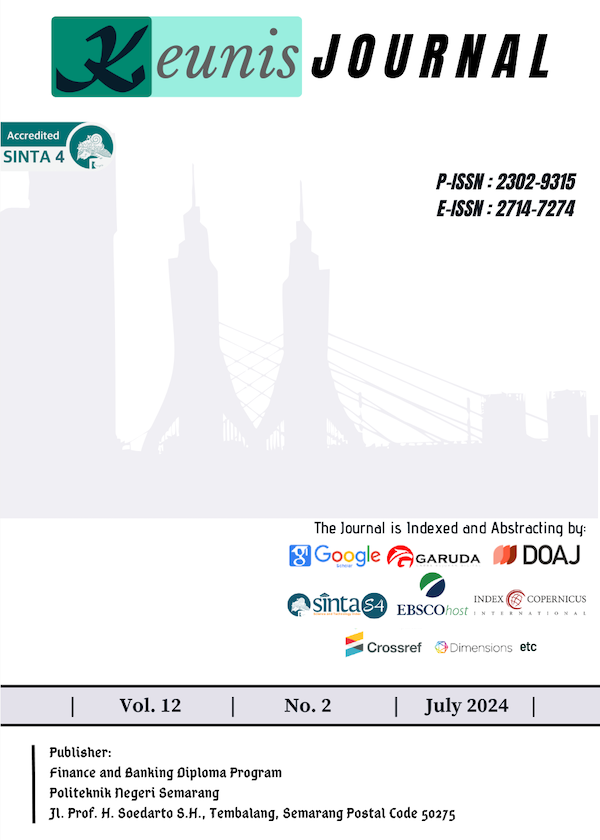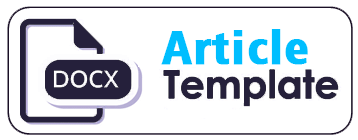FACTORS AFFECTING TAX AGGRESSIVENESS IN COMPANIES LISTED ON THE INDONESIAN STOCK EXCHANGE
DOI:
https://doi.org/10.32497/keunis.v12i2.5374Keywords:
tax aggresiveness, board independence, gender diversity, managerial ownership, institusional ownership, concentration ownershipAbstract
This research use quantitative research methods that examines the impact of board independence, gender diversity, managerial ownership, institutional ownership, and ownership concentration on tax aggressiveness. It also investigates how audit quality moderates the relationship between these variables and tax aggressiveness. The research, based on a purposive sample of 566 companies from audited financial reports on the Indonesia Stock Exchange (BEI) spanning 2018 to 2022, uses panel regression with EViews version 12. Findings indicate that board independence, gender diversity, and ownership concentration do not significantly affect tax aggressiveness, while managerial and institutional ownership have a noteworthy impact. Ineffective implementation of independent commissioners' roles, male dominance in management, and the lack of expected theoretical impact on overseeing management do not influence tax aggressiveness. The research also shows that audit quality as moderating variable does not significantly moderate the relationship between these variables and tax aggressiveness.References
Abdullah, M. I., Sarfraz, M., Qun, W., & Chaudhary, M. (2019). Ownership concentration impact on firm financial performance. Logforum, 15(1), 107”“118. https://doi.org/10.17270/J.LOG.2019.317
Aburajab, L., Maali, B., Jaradat, M., & Alsharairi, M. (2019). Board of Directors”™ Characteristics and Tax Aggressiveness: Evidence from Jordanian Listed Firms. Theoretical Economics Letters, 09(07), 2732”“2745. https://doi.org/10.4236/tel.2019.97171
Alfino, Y., & Sinaga, V. (2020). Analisis Pengaruh Konsentrasi Auditor, Independensi Dewan Komisaris Dan Ukuran Komite Audit Terhadap Penetapan Fee Audit External (Studi Empiris Pada Perusahaan Idx Bumn20 Periode 2015-2019). Dinamika Akuntansi, Keuangan Dan Perbankan, 9(2), 155”“166.
Andarsari, P. R. (2019). the Effect of Firm Size, Gross Profit Margin and Institutional Ownership on Disclosure of Corporate Social Responsibility (Csr). Jurnal Apresiasi Ekonomi, 7(3), 301”“308. https://doi.org/10.31846/jae.v7i3.254
Apriyanti, H. W., & Arifin, M. (2021). Tax aggressiveness determinants. Journal of Islamic Accounting and Finance Research, 3(1), 27”“52. https://doi.org/10.21580/jiafr.2021.3.1.7412
Aqmarina, F., & Furqon, I. K. (2020). Peran Pajak Sebagai Instrumen Kebijakan Fiskal Dalam Mengantisipasi Krisis Ekonomi Pada Masa Pandemi Covid-19. Finansia: Jurnal Akuntansi Dan Perbankan Syariah, 03(02), 256”“274. https://e-journal.metrouniv.ac.id/index.php/FINANSIA/article/view/2507%0Awww.febi.metrouniv.ac.id;
Ardillah, K., & Vanesa, Y. (2022). Effect of Corporate Governance Structures, Political Connections, and Transfer Pricing on Tax Aggressiveness. Sriwijaya International Journal of Dynamic Economics and Business, 6(April), 51”“72. https://doi.org/10.29259/sijdeb.v6i1.51-72
Board, E., Immanuella, I., Aprilina, V., Q, Y. N., Nasihin, I., Sagala, G. H., Medan, U. N., Putra, A. M., Nasional, U. P., Firdaus, M. I., Malang, U. N., Putra, P., Mahmudah, H., Trunojoyo, U., & Padjajaran, U. (2023). Dewan Redaksi Jurnal Riset Akuntansi & Komputerisasi Akuntansi Pengaruh Perencanaan Pajak terhadap Pengungkapan Pajak pada Perusahaan di Bursa Efek Indonesia. 88349033(83).
Boussaidi, A., & Hamed-Sidhom, M. (2021). Board”™s characteristics, ownership”™s nature and corporate tax aggressiveness: new evidence from the Tunisian context. EuroMed Journal of Business, 16(4), 487”“511. https://doi.org/10.1108/EMJB-04-2020-0030
Boussaidi, A., & Hamed, M. S. (2015). The Impact of Governance Mechanisms on Tax Aggressiveness: Empirical Evidence from Tunisian Context. Journal of Asian Business Strategy, 5(1), 1”“12. https://doi.org/10.18488/journal.1006/2015.5.1/1006.1.1.12
Chen, S., Huang, Y., Li, N., & Shevlin, T. (2019). How does quasi-indexer ownership affect corporate tax planning? Journal of Accounting and Economics, 67(2”“3), 278”“296. https://doi.org/10.1016/j.jacceco.2018.01.001
Dirjen Pajak: Penerimaan Pajak Tercatat Mencapai Rp868,3 T Hingga Akhir Juni 2022. (n.d.). Retrieved January 7, 2024, from https://www.kemenkeu.go.id/informasi-publik/publikasi/berita-utama/Dirjen-Pajak-Penerimaan-Pajak-Tercatat
Ejeh, B. U., & Salaudeen, Y. M. (2018). Equity ownership structure and corporate tax aggressiveness: the Nigerian context. Pressacademia, 5(2), 90”“99. https://doi.org/10.17261/pressacademia.2018.828
Eragbhe, E., & Obehi Igbinoba, O. (2021). Corporate Governance and Corporate Tax Aggressiveness: A Comparative Analysis. Journal of Social and Administrative Sciences Studies, 5(1), 12”“31. www.wdujournals.comwww.wdujournals.com
Firdaus, F. A., Nurlaela, S., & Masitoh, E. W. M. (2020). Institutional Ownership, Audit Quality, Gender Diversity and Political Connection to Tax Aggressiveness in Indonesia. JURNAL AKSI (Akuntansi Dan Sistem Informasi), 6(2), 91”“100. http://aksi.pnm.ac.id
Firmansyah, A. (2018). MANAJEMEN LABA, CORPORATE GOVERNANCE, KUALITAS AUDITOR EKSTERNAL DAN AGRESIVITAS PAJAK. Jurnal Tekun, 8(1), 108”“123.
Julita, J., & Fitri, D. D. (2021). Pengaruh Firm Size, Managerial Ownership Dan Return On Asset Terhadap Devidend Payout Ratio Pada Perusahaan Property Dan Real Estate Yang Terdaftar Di Bursa Efek Indonesia Periode 2014-2018. Seminar Nasional Teknologi Edukasi Dan Humaniora 2021, 1(1), 133”“147.
Khan, M., Srinivasan, S., & Tan, L. (2017). Institutional ownership and corporate tax avoidance: New evidence. Accounting Review, 92(2), 101”“122. https://doi.org/10.2308/accr-51529
Khurana, I. K., & Moser, W. J. (2013). Institutional shareholders”™ investment horizons and tax avoidance. Journal of the American Taxation Association, 35(1), 111”“134. https://doi.org/10.2308/atax-50315
Liana, S., Yanti, & Viriany. (2022). Faktor-Faktor Yang Mempengaruhi Agresivitas Pajak. Jurnal Pendidikan Indonesia, 3(08), 719”“739. https://doi.org/10.59141/japendi.v3i08.1115
Lubis, I., Suryani, & Anggraeni, F. (2020). The Effect of Managerial Ownership and Debt Policy on Tax Aggressiveness in Manufacturing Companies. Jurnal Akuntansi Dan Keuangan, 7(2), 211”“226.
Maharani, W. P., & Utami, E. R. (2019). the Influence of Institutional Ownership Towards Executive Compensation Considered By the Performance of the Company. Jurnal Reviu Akuntansi Dan Keuangan, 9(1), 85. https://doi.org/10.22219/jrak.v9i1.7879
Ogbonna, U. G., Emmanuel, U., & Mmesoma, E. A. (2022). Effect of Managerial Ownership and Tax Aggressiveness on Financial Performance of Domestic Systematically Important Banks in Nigeria. Ajebm, 5(10). https://www.grnjournals.us/index.php/AJEBM
PERUBAHAN KEEMPAT ATAS UNDANG-UNDANG NOMOR 7 TAHUN 1983 TENTANG PAJAK PENGHASILAN | Direktorat Jenderal Pajak. (n.d.). Retrieved January 7, 2024, from https://pajak.go.id/id/peraturan/perubahan-keempat-atas-undang-undang-nomor-7-tahun-1983-tentang-pajak-penghasilan
Putri, K. R., & Andriyani, L. (2021). Pengaruh Capital Intensity, Dewan Komisaris, dan Kepemilikan Institusional Terhadap Agresivitas Pajak. UM Magelang Conference Series, 465”“480. http://journal.unimma.ac.id/index.php/conference/article/view/4670
Putri, V. S., Hermawan, S., & Fitriyah, H. (2022). Can Managerial Ownership As a Moderating Variable On The Effect Of Intellectual Capital On Company Value? Evidence From Banking Companies In Southeast Asia. Jurnal Akuntansi, 11(1), 1”“25. https://doi.org/10.37932/ja.v11i1.525
Rachmawati, N. A., & Fitriana, A. (2021). The Effect of Financial Constraints and Institutional Ownership on Tax Agressiveness. ACCRUALS (Accounting Research Journal of Sutaatmadja), 5(01), 38”“53. https://doi.org/10.35310/accruals.v5i01.606
Rahayu, P., & Yani, A. (2021). Pengaruh Perubahan Tarif Pajak Penghasilan, Struktur Modal Dan Kebijakan Dividen Terhadap Harga Saham. Gorontalo Accounting Journal, 4(2), 184. https://doi.org/10.32662/gaj.v4i2.1732
Rahman, B., & Cheisviyanny, C. (2020). Pengaruh Kualitas Pengungkapan Corporate Social Responsibility, Dewan Direksi Wanita Dan Dewan Komisaris Wanita Terhadap Tax Aggressive. Jurnal Eksplorasi Akuntansi, 2(3), 2942”“2955. https://doi.org/10.24036/jea.v2i3.261
Rahmawati, N. T., & Jaeni. (2022). Pengaruh Capital Intensity, Leverage, Profitabilitas, Ukuran Perusahaan Dan Kepemilikan Manajerial Terhadap Agresivitas Pajak. JIMAT (Jurnal Ilmiah Mahasiswa ”¦, 13(2), 628”“636. https://ejournal.undiksha.ac.id/index.php/S1ak/article/view/42816
Ratnawati, V., Wahyunir, N., & Abduh, A. (2019). the Effect of Institutional Ownership, Board of Commissioners, Audit Committee on Tax Aggressiveness; Firm Size As a Moderating Variable. International Journal of Business and Economy, 1(2), 103”“114. http://myjms.mohe.gov.my/index.php/ijbechttp://myjms.mohe.gov.my/index.php/ijbechttp://myjms.mohe.gov.my/index.php/ijbec
Rennath, B. E., & Trisnawati, D. E. (2023). Pengaruh Kepemilikan Institusional Dan Pengungkapan Tata Kelola Perusahaan Terhadap Agresivitas Pajak. Jurnal Multiparadigma Akuntansi, 5(1), 423”“434.
Ribeiro, A. I. M. (2018). The Determinants of Effective Tax Rates: Firm Characteristics and Corporate Social Responsibility. Universidade Do Porto, 1(1), 1”“34.
Rinanda, Y., & Yuli Ardiany. (2020). Pengaruh Usia, Ukuran, Dan Independen Dewan Komisaris Terhadap Agresivensi Pajak. Ekasakti Jurnal Penelitian & Pengabdian, 1(1), 41”“55. https://doi.org/10.31933/ejpp.v1i1.89
Safitri, Niluh M., & Subroto, B. (2022). Pengaruh Tata Kelola Perusahaan Dan Kualitas Audit Terhadap Agresivitas Pajak. Tema, 23(2), 48”“61. https://doi.org/10.21776/tema.23.2.48-61
Sondokan, N. V, Koleangan, R. A. ., & Karuntu, M. M. (2019). Pengaruh Dewan Komisaris Independen, Dewan Direksi, Dan Komite Audit Terhadap Nilai Perusahaan Yang Terdaftar Dibursa Efek Indonesia Periode 2014-2017. Jurnal EMBA, 7(04), 5821”“5830.
Sri Utaminingsih, N., Kurniasih, D., Pramono Sari, M., & Rahardian Ary Helmina, M. (2022). The role of internal control in the relationship of board gender diversity, audit committee, and independent commissioner on tax aggressiveness. Cogent Business and Management, 9(1). https://doi.org/10.1080/23311975.2022.2122333
Sugeng, S., Prasetyo, E., & Zaman, B. (2020). Does capital intensity, inventory intensity, firm size, firm risk, and political connections affect tax aggressiveness? JEMA: Jurnal Ilmiah Bidang Akuntansi Dan Manajemen, 17(1), 78. https://doi.org/10.31106/jema.v17i1.3609
Suhartonoputri, I. A., & Mahmudi. (2022). Pengaruh Struktur Kepemilikan Terhadap Agresivitas Pajak. Diponegoro Journal of Accounting, 7(4), 1”“13. https://doi.org/10.20885/ncaf.vol4.art43sri
Vacca, A., Iazzi, A., Vrontis, D., & Fait, M. (2020). The role of gender diversity on tax aggressiveness and corporate social responsibility: Evidence from Italian listed companies. Sustainability (Switzerland), 12(5). https://doi.org/10.3390/su12052007
Veronika, M., & Yohanes, Y. (2022). Faktor-Faktor yang mempengaruhi Tax Avoidance di Perusahaan Non-Keuangan. E-Jurnal Akuntansi TSM, 2(4), 547”“564. https://doi.org/10.34208/ejatsm.v2i4.1825
Waheed, A., & Malik, Q. A. (2019). Board characteristics, ownership concentration and firms”™ performance: A contingent theoretical based approach. South Asian Journal of Business Studies, 8(2), 146”“165. https://doi.org/10.1108/SAJBS-03-2018-0031
Widarti, R. A., Merawati, E. E., Djaddang, S., & Ahmar, N. (2022). How Gender Diversity Influence Corporate Sustainability Performance: a Literature Review. Accounting Research Journal of Sutaatmadja (ACCRUALS, 06, 84”“95. https://doi.org/10.35310/accruals.v6i02.921%0Ahttps://ojs.stiesa.ac.id/index.php/accruals/index
Wijaya, D. (2019). Pengaruh Pengungkapan Corporate Social Responsibility, Leverage, Dan Kepemilikan Manajerial Terhadap Agresivitas Pajak. Widyakala Journal, 6(1), 55. https://doi.org/10.36262/widyakala.v6i1.147
Wijaya, I. (2021). The Effect Of Executive Compensation and Board of Director”™s Gender Diversity to Tax Aggressiveness. Jurnal EMBA Review, 1(2), 55”“61.
Xiao, T., Geng, C., & Yuan, C. (2020). How audit effort affects audit quality: An audit process and audit output perspective. China Journal of Accounting Research, 13(1), 109”“127. https://doi.org/10.1016/j.cjar.2020.02.002
Yohana, & Destriana, N. (2021). Analisis Faktor-Faktor yang Memengaruhi Agresivitas Pajak. Trisakti School of Management, 20, 1”“13.
Yopie, S., & Elivia, E. (2022). The Effect of Corporate Social Responsibility, Family Ownership on Tax Avoidance: The Effect of Audit Quality Moderation. Indonesian Journal of Economics, Social, and Humanities, 4(1), 29”“40. https://doi.org/10.31258/ijesh.4.1.29-40
Yudha Asteria Putri, P., Gusti Ayu Ratih Permata Dewi, I., & Putu Diah Putri Idawati, dan. (2019). Pengaruh Kualitas Audit Dan Leverage Pada Agresivitas Pajak Pada Perusahaan Manufaktur Yang Terdaftar Di Bursa Efek Indonesia Tahun 2013-2017. Jurnal KRISNA: Kumpulan Riset Akuntansi, 10(2), 148”“160. http://dx.doi.org/10.22225/kr.10.2.911.148-160
Zemzem, A., & Ftouhi, K. (2013). The Effects of Board of Directors ”™ Characteristics on Tax Aggressiveness. Research Journal in Finance and Accounting, 4(4), 140”“148.
Zhou, Y. (2011). Ownership structure, board characteristics, and tax aggressiveness. Lingnan University, 69.
Downloads
Published
How to Cite
Issue
Section
License
KEUNIS is licensed under a Creative Commons Attribution-ShareAlike 4.0 International License.
Authors who publish with this journal agree to the following terms:
- Authors retain copyright and grant the journal right of first publication with the work simultaneously licensed under a Creative Commons Attribution-ShareAlike 4.0 International License that allows others to share the work with an acknowledgement of the work's authorship and initial publication in this journal.
- Authors are able to enter into separate, additional contractual arrangements for the non-exclusive distribution of the journal's published version of the work (e.g., post it to an institutional repository or publish it in a book), with an acknowledgement of its initial publication in this journal.
- Authors are permitted and encouraged to post their work online (e.g., in institutional repositories or on their website) prior to and during the submission process, as it can lead to productive exchanges, as well as earlier and greater citation of published work (See The Effect of Open Access).






